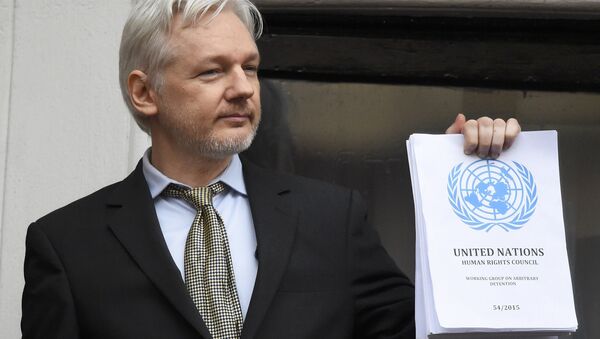The UN Working Group knocked back UK appeal to have the case reinvestigated, arguing the British government had not presented any fresh evidence to warrant a re-examination.
UN panel rebuffs Britain over #Assange ruling https://t.co/71wQs5Ahua
— WikiLeaks (@wikileaks) November 30, 2016
More: https://t.co/Mb6gXlz7QS
"The UN expert group also considered four requests for review of previous opinions, submitted by the Arab Republic of Egypt, the State of Kuwait and the United Kingdom of Great Britain and Northern Ireland. The Working Group concluded that the requests did not meet the threshold of a review as enshrined in paragraph 21 of its methods of work, and that they were thus not admissible," the panel said, according to the Washington Times.
Reacting to the news, Julian Assange called for British and Swedish authorities to allow him to travel to Ecuador, where he was granted political asylum in 2012.
Julian Assange says he shd be "set free" after a UN panel confirmed the WikiLeaks founder is victim of arbitrary detention — @wikileaks
— Alan Jones (@AlanJonesPA) November 30, 2016
"Now that all appeals are exhausted I expect that the UK and Sweden will comply with their international obligations and set me free. It is an obvious and grotesque injustice to detain someone for six years who hasn't even been charged with an offence."
In a statement on behalf of WikiLeaks, the campaign group Justice for Assange said the UN's decision to uphold its previous ruling meant that "the UK and Sweden are once again required to immediately put an end to Mr Assange's arbitrary detention and afford him monetary compensation."
UK Rejects Findings
The appeal comes after the Working Group released a report in February, which concluded Assange's stay in the Ecuadorian embassy amounted to unlawful "arbitrary detention" and urged British and Swedish authorities to come to an agreement that would allow the Australian, who is the subject of a sexual assault investigation in Sweden, a safe right of passage to Ecuador.
Despite the findings, it appears unlikely the latest development will have much of an impact on Assange's situation, with Sir Alan Duncan, Foreign Office Minister for the Americas, rejecting the UN working group's findings.
#Assange Press Statement on #UN decision to reject #UK request for review of release decision pic.twitter.com/J550w3oJpH
— Melinda Taylor (@theMTchair) November 30, 2016
"Julian Assange is not, and has never been, arbitrarily detained in the UK and his continued presence in the Ecuadorean Embassy is entirely self-inflicted. We completely reject the opinion of the UN Working Group and are very disappointed that they will not review their deeply flawed and incorrect position," he said.
"A European Arrest Warrant for an allegation of rape remains outstanding and the UK has a legal obligation to extradite him to Sweden," he added.
UN's Note to Editors over #Assange decision: "The Opinions of the WGAD are legally-binding" https://t.co/ire5leRc5O pic.twitter.com/IvkCrvnfUf
— WikiLeaks (@wikileaks) August 11, 2016
"He has exhausted the well-recognized protections available to him under the British legal system. He has been avoiding arrest by choosing to remain in the Ecuadorean Embassy for more than four years now and the UK wants to see a conclusion to this case."
"We continue to encourage Ecuador and Sweden to work together to resolve this frustrating situation and we will continue to work to support that happening."
The UN Working Group on Arbitrary detention has said that its findings are legally-binding in the extent that they are based on binding international human rights law, however British officials have dismissed the call to honor the group's findings.


